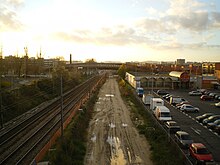Tram Express North
The Tram Express Nord is a light rail connection of the suburbs north and northeast of Paris, which currently runs between Épinay-sur-Seine and Bourget. When completed, the line will run from the Sartrouville RER station in the Yvelines department to the Noisy-le-Sec station in the Seine-Saint-Denis department . In the initial planning phase, the term Tangentielle Nord was used, which was replaced by the term Tram Express Nord at the beginning of 2014 . Since summer 2016, it has been known as T11 .
It is a railway project in the Île-de-France region , which corresponds to the greater Paris area. The STIF organization , which is responsible for local public transport in the region, has classified the line as a tram-train . The middle section between the Épinay-sur-Seine and Bourget stations went into operation on July 1, 2017, and operations on the entire route are scheduled to begin with Horizon 2020 , although the financing of the remaining routes was not yet secured in 2016. The project planning is carried out by STIF , while the SNCF and RFF are responsible for the construction . The operation will be taken over by the SNCF.
route
General

The final line will have a length of 28 km and have 14 stops. There should be transfer options to RER, Transilien , tram and in future also to the Grand Paris Express . There are currently 7 stops on an eleven kilometer route.
This project takes a new approach: Since the line is intended exclusively for passenger traffic, it will not be expanded to correspond to a standard railway, but rather like a German light rail : The track spacing and thus the subgrade width is smaller (8.5 instead of the usual 10 m) and light tram-train vehicles are used, which both keeps the noise level within limits and reduces the demands on the route construction. The double-track route will be built alongside the existing Ligne de la grande ceinture de Paris , the Paris Ring Railway, which is primarily used for freight traffic .
The middle section
The Epinay-sur-Seine - Le Bourget section is the middle section of the route and was built first. Three new stations were added to the four existing stations. All are transfer points to other local transport routes. Seven level crossings were replaced by bridges or underpasses.
With the first preparatory construction work (laying of supply lines etc. Ä.) was started in 2009 and from December 2010 work was carried out on the infrastructure of the route. This section went into operation on July 1, 2017.
The equipment of the route is unusual for a tram line: the average distance between the stops is almost 2 km. The operating voltage is 25 kV. The trains run at a maximum speed of 100 km / h, which means a cruising speed of almost 50 km / h is reached.
Extension to the west
Four new train stations are being built:
-
Sartrouville


- Sartrouville Val Notre-Dame
- Val d'Argenteuil

-
Argenteuil

Extension to the east
Three new train stations are being built:
-
Drancy -Bobigny

- Bobigny-La-Folie
- Noisy-le-Sec


Operation, vehicles and maintenance
Operation is not carried out with classic full-line vehicles, but with Citadis Dualis tram-train vehicles . The vehicles are 42 m long, 2.65 wide and can accommodate 250 passengers. The maximum speed is 100 km / h.
11 trains are currently required. After the entire route has been completed, 38 sets will be used. The vehicles are serviced in the depot in Noisy-le-Sec, which was officially inaugurated on September 15, 2016. The route control center is also located there.
At the beginning of June 2014, STIF decided to purchase 15 Dualis sets. Deliveries began in summer 2016. On July 1, 2017, operations began on the first section of the route between Epinay and le Bourget. The STIF will cover the cost of 88 million euros.
At rush hour, an interval of five minutes is provided, otherwise the trains run every ten minutes. The total travel time from Sartrouville to Noisy-le-Sec should be 35 minutes.
Passenger numbers and connections to the rail network
42,000 travelers per day are expected on the first section of the route. The train has connections to the RER B , RER C and RER D lines , to the H line of the Transilien network, the T8 tram line and later to the 16 and 17 lines of the Grand Paris Express project .
After completion of the entire route, up to 250,000 passengers are expected every day. Connections to the RER A , RER E and to the L and J lines of the Transilien will be established on the extension routes .
See also
Individual evidence
- ↑ http://www.stif.info/IMG/pdf/nouveau_grand_paris.pdf STIF announcement on the planned rail projects in the Paris metropolitan area (French) with map; Retrieved February 25, 2014
- ↑ Comment: The first drafts were based on commissioning in 2014 (for the first section) and in 2017 (for the entire route).
- ^ Tangential North , accessed May 29, 2014
- ↑ Internet edition of Le Parisien from June 14, 2016 (French); Retrieved August 26, 2016
- ^ Railway Gazette of September 16, 2016: T11 Express depot opened (Engl.), Accessed on December 11, 2016
- ^ France 3 communication of June 5, 2014 (French) accessed on June 6, 2014
- ↑ [1] mobilicites.com of September 16, 2016: M-10 pour le tram-train 11 Express en IDF, accessed on March 31, 2017



